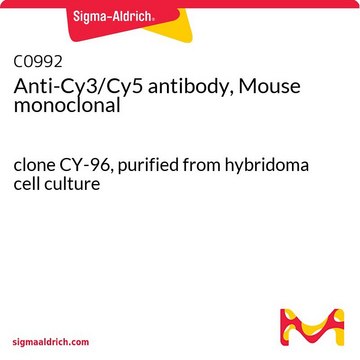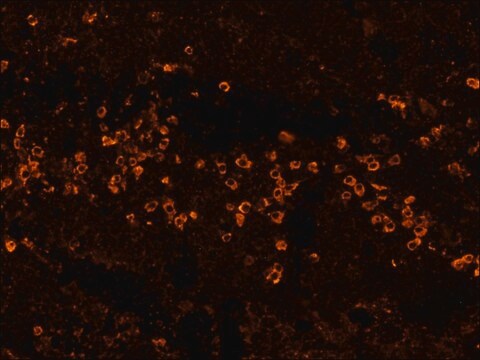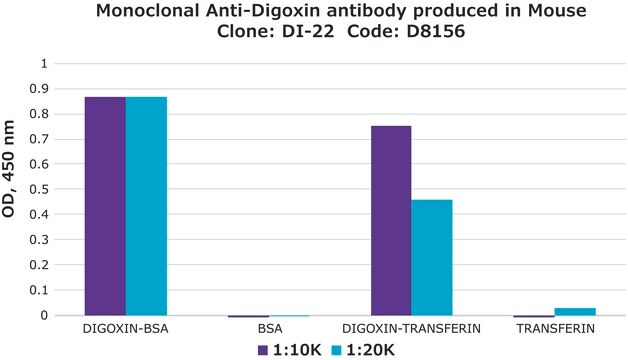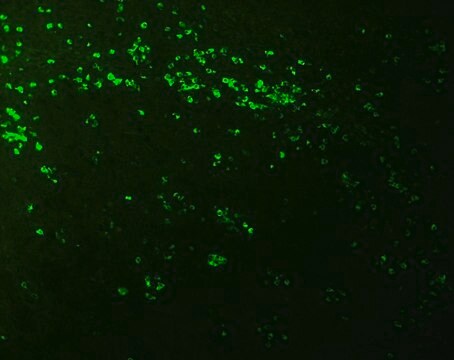추천 제품
생물학적 소스
mouse
Quality Level
결합
biotin conjugate
항체 형태
purified immunoglobulin
항체 생산 유형
primary antibodies
클론
CY-96, monoclonal
양식
buffered aqueous solution
농도
~1 mg/mL
기술
direct ELISA: suitable
dot blot: suitable
immunocytochemistry: 1-2 μg/mL using chicken fibroblasts
microarray: suitable
동형
IgG2a
배송 상태
dry ice
저장 온도
−20°C
타겟 번역 후 변형
unmodified
유사한 제품을 찾으십니까? 방문 제품 비교 안내
일반 설명
Monoclonal Anti-Cy3/Cy5 (mouse IgG2a isotype), Biotin conjugate is derived from the CY-96 hybridoma produced by the fusion of mouse myeloma cells (NS1 cells) and splenocytes from BALB/c mice immunized with a mixture of proteins labelled with cyanine 3 (Cy3) or Cy5. Cyanine dyes are ionized polymethine dyes.
특이성
The antibody recognizes Cy3 and Cy5 conjugated to proteins.
면역원
mixture of proteins labeled with Cy3/Cy5.
애플리케이션
Monoclonal Anti-Cy3/Cy5 Biotin antibody produced in mouse has also been used in:
- enzyme linked immunosorbent assay (ELISA)
- immunocytochemistry
- dot blot assay
- protein microarrays
- immunofluorescenc
Monoclonal Anti-Cy3/Cy5-Biotin antibody produced in mouse was used to label miR-107 in human breast cancer cell lines by confocal microscopy.
생화학적/생리학적 작용
Cy dyes are pH insensitive fluorophores that are used to label, DNA, RNA and proteins in a variety of biological assays.
Cyanine dyes are small, soluble in aqueous solution and has tolerance to dimethyl sulfoxide (DMSO). They are more photostable than fluorescein, has high molar extinction coefficients and favourable quantum yields. Monoclonal antibodies to cyanine 3 (Cy3) and/or Cy5 are an important tool for Cy3/Cy5 signal amplification in assays where biomolecules are labelled with Cy3 or Cy5.
물리적 형태
Solution in 0.01 M phosphate buffered saline, pH 7.4, containing 15 mM sodium azide.
면책조항
Unless otherwise stated in our catalog or other company documentation accompanying the product(s), our products are intended for research use only and are not to be used for any other purpose, which includes but is not limited to, unauthorized commercial uses, in vitro diagnostic uses, ex vivo or in vivo therapeutic uses or any type of consumption or application to humans or animals.
적합한 제품을 찾을 수 없으신가요?
당사의 제품 선택기 도구.을(를) 시도해 보세요.
Storage Class Code
10 - Combustible liquids
WGK
WGK 3
Flash Point (°F)
Not applicable
Flash Point (°C)
Not applicable
개인 보호 장비
Eyeshields, Gloves, multi-purpose combination respirator cartridge (US)
가장 최신 버전 중 하나를 선택하세요:
25th Anniversary Article: Design of Polymethine Dyes for All-Optical Switching Applications: Guidance from Theoretical and Computational Studies
Gieseking RL, et al.
Advanced Materials, 26(1), 68-84 (2014)
Quantitative profile of the uropathogenic Escherichia coli outer membrane proteome during growth in human urine
Alteri CJ and Mobley HLT
Infection and Immunity, 75(6), 2679-2688 (2007)
N Duval et al.
The Journal of cell biology, 118(3), 641-653 (1992-08-01)
We analyzed the production of Torpedo marmorata acetylcholinesterase (AChE) in transfected COS cells. We report that the presence of an aspartic acid at position 397, homologous to that observed in other cholinesterases and related enzymes (Krejci, E., N. Duval, A.
D M Mottola et al.
The Journal of pharmacology and experimental therapeutics, 262(1), 383-393 (1992-07-01)
The present work provides a detailed pharmacological characterization of dihydrexidine (DHX) (trans-10,11-dihydroxy- 5,6,6a,7,8,12b-hexahydrobenzo[a]phenanthridine), the first high-potency, full efficacy, bioavailable D1 dopamine receptor agonist. DHX represents a new conformationally rigid structural class of dopamine receptor ligands. It competes stereoselectively and potently
Pai-Sheng Chen et al.
The Journal of clinical investigation, 121(9), 3442-3455 (2011-08-16)
MicroRNAs (miRNAs) influence many biological processes, including cancer. They do so by posttranscriptionally repressing target mRNAs to which they have sequence complementarity. Although it has been postulated that miRNAs can regulate other miRNAs, this has never been shown experimentally to
자사의 과학자팀은 생명 과학, 재료 과학, 화학 합성, 크로마토그래피, 분석 및 기타 많은 영역을 포함한 모든 과학 분야에 경험이 있습니다..
고객지원팀으로 연락바랍니다.







